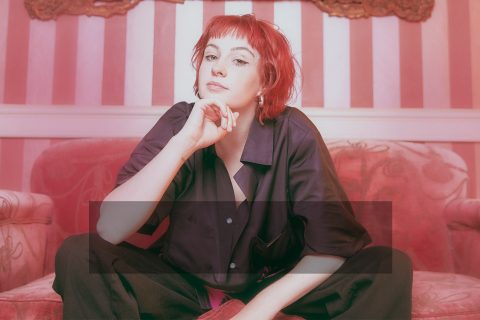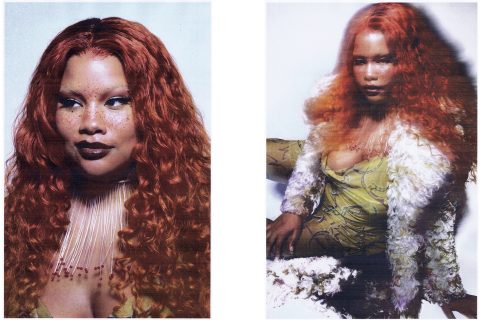
Head of the NiNE8 collective, a staunch Londoner and a multifaceted artist, Lava La Rue, also known as Ava Laurel, has marched loud-voiced through a year covered in mud. From the rise in the fluidity of sexuality, to the youth’s distrust of current governments, their music, wrapped with a deep intellectualism, was seen to trudge through issues signalling the everyday reality of UK kids.
While one release, ‘Angel’, aside Deb Never, storied a narrative of young queer love through tantalizingly psychadelic sounds, another, their Summer of Love 2.0 audio-visual project, touched on a theory of the resurgence of the 60’s free love movement, sparked by the 2020 pandemic, and carried on the back of the BLM global rallies.
Her upcoming EP Butter-fly, releasing January 2021, is perhaps to be a time capsule of the year gone by, and is said to depict moments of personal transformation for Lava from their mixtape Stitches. Now, as the year draws to a close, ACCLAIM got the chance to reflect with Lava on the past few months, both in politics and music, discussing their inspirations, while also touching on their beginnings at college.
Congratulations on your latest release ‘Angel’. How did the song come together, and what was it like working with the real life inspiration, Deb Never?
Deb almost feels like my long lost twin. We are very much on the same wavelength, so it felt natural. She ended up living a 30-second walk from my house for a couple of weeks when we were both working on our new projects. By loads of coincidences like that, we kept on being in the same place at the same time with similar inspirations. So making stuff together made sense.
Your previous EP Stitches touches on a broad range of topics including politics, love, and being authentic. What can we expect from your upcoming mixtape Butter-fly in comparison to Stitches?
I spent a lot of time on this new project, trying to push myself as a musician, getting better at instrumentation, learning about production and studying great songwriters. So in a greater sense the musicality side of things massively levelled up from my last project. Narrative wise I’ve definitely honed in on the subject of queer love and explored it within genres where I wish there were more queer stories on that kinda sound.
Does the title Butter-fly have meaning for you?
Yes! The whole project was made in a truly transitional time where I felt like I had finally found my wings and settled into a place where I was able to practice a lot of the things I believed in. So the word “butterfly” made sense, but I especially split up the word into “butter” and “fly” with the hyphen because both those words by themselves have both ugly and beautiful connotations. The word “butter” makes me think of grease and excess, but also smoothness and taste (smooth like butter), and the word “fly” makes me think of the insect and its connection to death & excretion, but also to literally fly and be liberated. I guess it represents the process to join those words together and be transitional. The hyphen is the growing pain. Then finally it’s the follow up project after “Stitches” ….butterfly stitches, the healing of wounds.
A really interesting project that you did this year was The Summer of Love 2.0 project that surrounded the idea that the 1960’s free love moment had resurfaced in 2020. Where did this observation or realization come from that there had been a resurgence? And why did you decide to conceptualize it the way you did?
I think it definitely was about the ideological resurgence. There’s been two official historical summers of love, and both of them came out of a youth revolt against the government, societal standards and a lot of drugs, art, music, sex and partying, causing a cultural renaissance. In the 1960s summer of love, kids in America were protesting the Vietnam war, protesting everything, questioning authorities, taking psychedelics and practising free love. In the 1980s summer of love (that happened in the UK), thousands of youths were unemployed, couldn’t find any kinda work and were going to big illegals warehouse raves and taking ecstasy, experimenting with electronic sounds.
These shifts of socio-economic change in government always have ripple effects on how the youth respond. So flash forward into the 2020 pandemic, loads of youths have been made unemployed or dropped out of uni, there’s a huge lack-of-trust in government, a generation has been protesting BLM all summer, and there has been the biggest rise in history of people outwardly questioning gender norms and sexuality. On top of that the pandemic has forced venues to shut down, meaning here in London there has been the biggest revival I’ve seen in large illegal raves in the past 7 years, a huge rise in people turning to psychedelics as therapy, and artists being forced to strip-down their process and focus on creativity. It all sounds familiar to me.
What in general is the process for when you’re pulling together inspiration for music or music videos? Do you purposely pull bits and pieces from different eras and genres, or does it just come naturally?
It’s mostly subconscious in terms of pulling different genres together, as normally I’m listening to 1000 different records from different eras, and it all naturally spills out in the music. Most of my references do come from the 70s, 80s and 2000s era. I’m really inspired by past legends and rockstars for sure, but try and channel that in my own way.
You release a really diverse range of content across multiple platforms. You’ve got avenues like your DIY talkshow, the NiNE8 collective, your music and music videos, just to name a few. Where does this driving energy but also the ability to create so many different forms of content come from?
Honestly, I really don’t know how to sit still. I don’t know what to do with myself when I’m not creating, like that doesn’t sound fun. It’s not even that I find it hard to just tune out and have non-working time so that I’m only focused on the music, but me and my friends genuinely do things like podcasts and cinematography and graphic design as a hobby. It’s what I wanna do in my spare time when I get home from work. Finding old typefaces and making cover art for my friends brings me the same enjoyment I imagine watching reality TV does for people.
Had you always had a creative passion or been a creative person growing up?
Yes, I had a lot of imaginary friends growing up. I was one of those kids who liked to make experiments like mixing household chemicals together to see what they would make when nobody was home. I was also always drawing comics.
You were in college for music aside Biig Piig, Dave, Mac Wetha and a few other people that have gone on to become well known in the music world. It seems like there was a lot of up-and-coming talent coming in one place. Why do you think that was?
I used to think it was just coincidence because, honestly, it was not a good school at all. I remember turning up on the first day being told we had our own school police because some kid got stabbed in the cafeteria the year before me, Mac and Piig joined. Then all of my friends would bunk and it was super chaotic. Honestly crazy everyone did so well, but the more I think about it, that might have been the recipe. The college let in kids from all different kinds of backgrounds and we were kind of left to our own devices. If you wanted to work hard and get your qualifications (like Mac did) you could do that. And if you wanted to vibe and meet new people and jam in the music room, you could get away with it for a bit (like me and piig did). I think they definitely got stricter after we left though.
With your group nine8 what brought you together was your collaborations and trades in creative currency. As you get older is there something else about the group that keeps you together, and where do you see the group going in the future?
Our collaborations and trades in creativity are still the foundation of the collective. The more we grow the more we all bring to the table and share what we’ve learned, so it only gets more and more. But also as the years go by our bonds get tighter and tighter too. Nayana & Lorenzorsv were fresh 16-year-olds when I first met them and when they joined the collective, and I got to see them find their feet writing and blossoming into young adults. Now they teach me.
If nine8 had a catchphrase what do you think it would be?
In 2017 it used to be “organised chaos”, but I feel like we’ve transitioned out of that. Maybe “more time” because that’s what L!BAAN always says before he’s about to tell a story, and we always jokingly throw it into songs now.
Mac Wetha from nine8 is a producer that both you and Biig Piig collaborate a lot with, what is it about him that keeps you going back?
He’s our best friend and he’s insanely talented and funny and quick to work with. It’s great working with someone who’s known you since before you’ve even started making music because he’s almost always on the same page creatively but also up for anything.
There was a video you released on EP 1 of your Lavaland talk show where you were discussing influential songs of the 2010’s, and you predicted a couple of trends for the new century including the rise of brit-pop. Now that we’ve gone through 2020, have any of your predictions come true?
Pretty much all of them came through. Drill definitely had a huge cultural fusion, went to New York, came back to UK, travelled around Europe and got its own sub-genre fusions. Alternative music like Britpop resurfaced as well but with a more diverse voice and even in the UK pop-punk is fusing with a kinda trap sound to make an interesting bedroom music scene. People are definitely enjoying guitar-based pop music again like it’s the 2000s.
Additionally, what have been some influential songs for you so far this decade?
Yves Tumors whole album. All of Song Machine by the Gorillaz. Everything Thundercat has been up to. I have a special place for the opening song on Ariana Grande’s new album too.
Last question, other than your upcoming mixtape Butter-fly, what has 2021 got planned for you?
Making Movies, Vinyls, More great songs. Better music videos. Lots of NiNE8 fun.
Follow Lava La Rue here for more and watch ‘Angel’ ft. Deb Never below.



